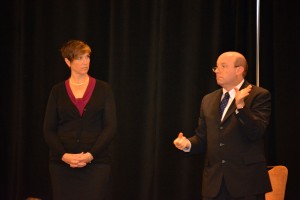Educational Interpreters: The Missing Piece of the IEP Teams
 Richard Brumberg and Donna Flanders’ workshop, Educational Interpreters: The Missing Piece of IEP Teams, empowers educational sign language interpreters by providing the tools to become an effective member of the IEP team. The interpreters in attendance were largely K-12 classroom interpreters who walked away with tangible tools, direct talking points and creative resources to bring back to the classroom.
Richard Brumberg and Donna Flanders’ workshop, Educational Interpreters: The Missing Piece of IEP Teams, empowers educational sign language interpreters by providing the tools to become an effective member of the IEP team. The interpreters in attendance were largely K-12 classroom interpreters who walked away with tangible tools, direct talking points and creative resources to bring back to the classroom.
The workshop provided a historical perspective of interpreters in the mainstream setting, which under IDEA, does not require interpreter participation. In order to access the EIP meeting, we were given tools to prove we are in fact stakeholders. Our creditials of certification and licensure are our proof that we valid members of the team, who are worthy of participation in the IEP discussions. We are unlike other “accommodations”, as we human. The team can’t ask the hearing aid how it works with the student. We have valuable insight that is essentially at the heart of IEP development.
The First Day
Brumberg and Flanders provided a glimpse of what to expect on “the first day”. The first day could be on day 1 of the school year, the interpreters first day on the job, or the day after an IEP meeting. Recommended actions for day one included getting access to the IEP, asking for lesson plans, explaining processing time delays and suggesting visual additions. Interpreter requests forms can be developed for middle and high school students in order to foster the understanding of the interpreter profession and the planning that goes into securing interpreter services. One other first day resource was the a sentence that hit home to many attendees, “”I am here to make communication accessible. Sometimes I may stand, sit or move around in order to make that happen. Feel free to tell me to move. You see, it’s part of my job to stand in your way.”
IEP Implementation
The presentation went on to layout the daily role implementing an IEP. As the year progresses, interpreters continue to work with the members of the IEP team to achieve the student’s goals. This includes creating a substitute interpreter folder so that the student has consistent access to information while the regular interpreter is out. The regular interpreter can write out or film vocabulary, language preferences, name signs and tips on the school routine. This allows this sub to focus on interpreting content rather than working out logistics. Classroom interpreters should be checking in on goals and benchmarks listed in the IEP and documenting evidence. In times where the student is off track or the IEP is not meeting the student’s current needs, it is important to confide in the team. Brumberg and Flanders pointed out the root of confidentiality is to confide. Interpreters can tell the IEP team in confidence. An interpreter can request that an IEP meeting is called prior to the annual meeting in order to make changes to the IEP to better meet the student’s needs.
Brumberg and Flanders summarized Brenda Schick’s theory of the modes through which students are able to access information and their ability to apply this access to various types of social interactions. This framework provided attendees with the platform to base their observations on in preparation to deliver to the IEP team. Later the presentation offered scripts of ways classroom interpreters can present data on the student’s language. Considering IEP teams have so many players coming from different perspectives, it’s important that the classroom interpreter be well versed in our specialty and not divert other’s specialties.
IEP Preparation
In preparation for the next IEP meeting, it is important to bring information to support assertions. reviewed the IEP process and the work on either end of the meeting. Just as any other member of the team, we should bring evidence to support our assertions. This evidence should be gathered throughout the year and be documented and dated.
Brumberg and Flanders gave the attendees a leg to stand on, an articulate approach and power to use them both in a way that will truly impact a Deaf student’s education. In times of doubt, both Brumberg and Flanders we reassuring and confidents, “It will take to change your system, but if you do nothing it will never change. You can’t give up.” As educational interpreters, we really can’t give up. We cannot let our students down. We cannot let our community down.
* Special thanks to Street Team member, Hayley Baccaire.








